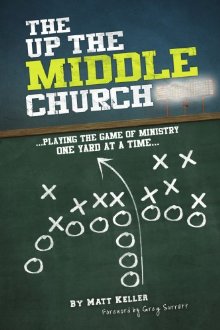BOTW: The Up the Middle Church
Over the last few months, the B99 and I have been increasingly interested in the whole church planting movement, and so a few weeks ago I had coffee with a successful church planter in Charlotte to discuss all things church planterish (Hey! I think I just invented a new word!!). Mike Field is a quiet man full of tons of practical ideas about church plants, and has done a fantastic job planting Hope Church, which in turn has already planted another church in the uptown of Charlotte. The conversation was very encouraging, and when we were done Mike slid a book across the table and told me to read it, and so it became book #12 on my year long reading journey.
The Up The Middle Church: Playing the Game of Ministry One Yard at a Time, by Matt Keller, took awhile for me to really get into. I was a little hesitant to write that, but I am trying to honestly write about the books I read, and the writing style of this one wasn’t on the same level as what I’ve read in other books this year. Not that it was a hard book to read; it just felt cumbersome at times and didn’t seem to flow. Throw in a number of mis-spelled words and typos and I got the feeling that maybe this book got rushed out to the presses without a really good proofreading. But, all that being said, the content of the book is really good, and incredibly practical. No doubt that the B99 and I will reference this book often if we continue walking down the church planting path.
The basic premise of the book was that in the church world, and especially among church plants, the churches and leaders we always here about are the ones who, in Keller’s words, experience the “long-bomb.” These are the churches that start in a basement somewhere and then have 1,000 or more people attending within a year. Keller doesn’t say that the long-bomb is bad, but that it isn’t normal, and it wasn’t his experience in planting Next Level Church in southern Florida. Normal in the church planting realm is “up the middle,” a phrase which Keller uses about a million times over the 181 pages of the book. Up the middle for Keller describes their experience of building a church “one yard at a time” by doing the small things consistently and trusting God in the slow, steady growth. While not as exciting as a hail-mary, Keller says it is what most new church plants should expect so that they don’t get discouraged when they aren’t the next overnight success on the cover of every Christian publication in the free world.
Keller divides The Up the Middle Church into 4 sections: the Practical Side, the Process Side, the People Side, and the Personal Side. Throughout the book he discusses everything from how to create a buzz about what your church is doing to how to stop answering your cell phone every time it rings (a lesson most of us could benefit from, even if we’re not planting a church). I especially soaked up chapter 5, “Voices on the Field.” In it, Keller wrote about the need to turn some voices down (the negative, the skeptical, and the “old way” voices) while also turning some voices up by finding three distinct people to learn from: someone you want to be like, someone who is doing what you want to do, and someone who is a step or two ahead of you. Very good stuff in there.
Other notable parts:
We never want people to feel more acceptance at a bar than they do in our church. (p. 23)
We really believe our purpose isn’t to build a great church, but to build people. (p. 26)
At NLC, we define a win as having the ability to influence people over an extended period of time. (p. 61)
Being mobile doesn’t mean you can get away with sloppy. (p. 69 – speaking in reference to portable church plants)
Never cut corners on quality, especially in areas that directly touch people. (p. 74)
Don’t grow a church, grow a team. (p. 113)
Pastor your church as if it’s twice the size (from Ed Young, Jr.)…Don’t do at 100 what you can’t do at 200. (p. 151)
Success isn’t based on horizontal comparisons, but on vertical obedience. (p. 176)
For me, that last nugget about vertical obedience was worth the entire book. Wherever you are in ministry (staff member, pastor of an existing church, current or future church planter), you’ll benefit tremendously from picking up Matt’s book and taking the time to read through it.








LOL crazy man! I love reading your writings!